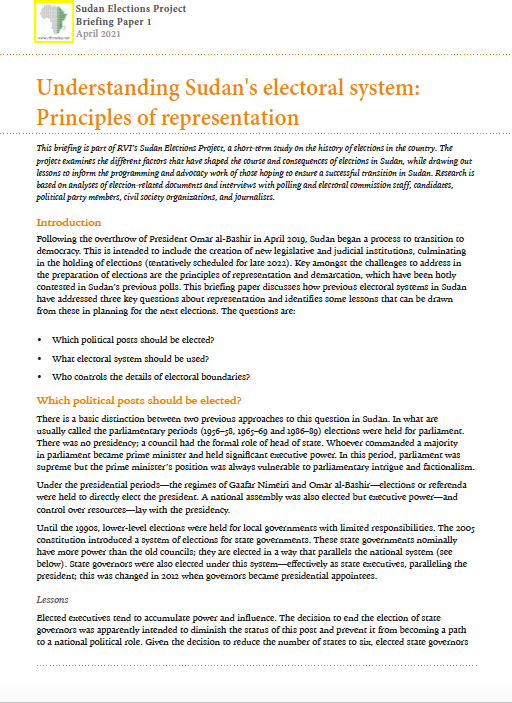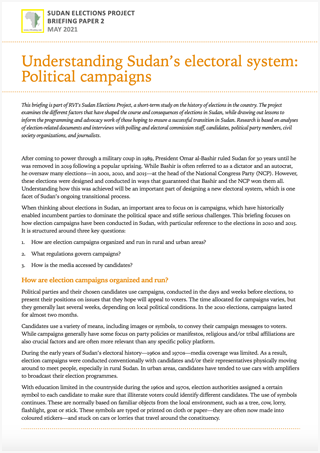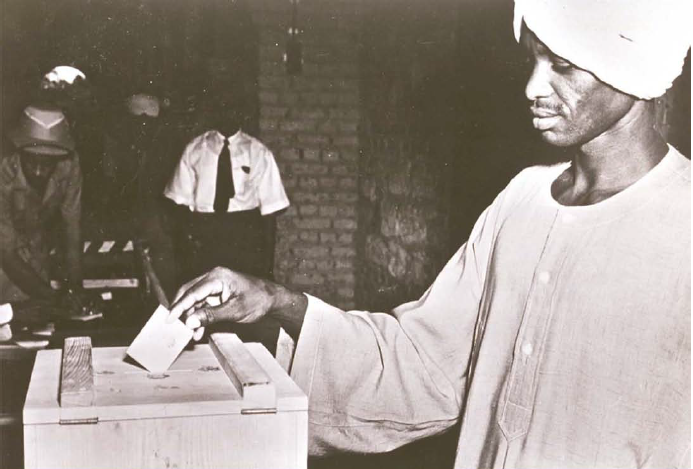
The RVI Sudan Elections Project is a short-term study on the history of elections in Sudan—particularly the 2010 and 2015 elections. The project aims to examine the drivers and constraints that have shaped the course and consequences of previous elections in Sudan while drawing out lessons to inform programming and advocacy work of actors working to ensure a successful transition in Sudan. Research will focus on electoral institutions and the people around them, including polling staff, electoral commission staff, candidates, political party members, civil society organizations and journalists, highlighting their experiences in previous polls and expectations for a more representative electoral system in Sudan.
The project is led by Professor Justin Willis (Durham University) and Professor Munzoul Assal Professor of social anthropology and senior fellow at Peace Research Institute (PRI), University of Khartoum.
مشروع انتخابات السودان التابع لـمعهد الاخدود الافريقي عبارة عن دراسة قصيرة المدى حول تاريخ الانتخابات في السودان – لا سيما انتخابات ٢٠١٠ و٢٠١٥. يهدف المشروع إلى دراسة الدوافع والقيود التي شكلت مسار وعواقب الانتخابات السابقة في السودان مع استخلاص الدروس لتوجيه عمل البرمجة والمناصرة للجهات الفاعلة التي تعمل لضمان انتقال ناجح في السودان. سيركز البحث على المؤسسات الانتخابية والأشخاص حولها، بما في ذلك موظفي الاقتراع وموظفي المفوضية الانتخابية والمرشحين وأعضاء الأحزاب السياسية ومنظمات المجتمع المدني والصحفيين، مع تسليط الضوء على تجاربهم في الانتخابات السابقة وتوقعاتهم عن نظم انتخابية أكثر تمثيلاً في السودان.
يقود المشروع البروفيسور جوستين ويليس (جامعة درهام) ومنزول عسل بروفيسور الأنثروبولوجيا الاجتماعية وزميل أقدم في معهد أبحاث السلام بجامعة الخرطوم.
Publications
The project’s publications include 5 briefing papers to help readers understand Sudan’s existing electoral system, and the choices required to design a new one.
المنشورات
تشمل منشورات المشروع ٥ أوراق موجزة لمساعدة القراء على فهم النظام الانتخابي الحالي في السودان والخيارات المطلوبة لتصميم نظام جديد.
Briefing 1: Understanding Sudan’s electoral system: Principles of representation
ملخص ١: فهم النظام الانتخابي السوداني: مبادئ التمثيل
Following the overthrow of President Omar al-Bashir in April 2019, Sudan began a process to transition to democracy. This is intended to include the creation of new legislative and judicial institutions, culminating in the holding of elections (tentatively scheduled for late 2022). Key amongst the challenges to address in the preparation of elections are the principles of representation and demarcation, which have been hotly contested in Sudan’s previous polls.
This briefing paper discusses how previous electoral systems in Sudan have addressed three key questions about representation and identifies some lessons that can be drawn from these in planning for the next elections. 1) Which political posts should be elected? 2) What electoral system should be used? 3) Who controls the details of electoral boundaries?
بعد الإطاحة بالرئيس عمر البشير في أبريل ٢٠١٩، بدأ السودان عملية الانتقال إلى الديمقراطية. يشمل ذلك إنشاء مؤسسات تشريعية وقضائية جديدة تتوج بإجراء انتخابات (مبدئيًا من المقرر إجراؤها في أواخر عام ٢٠٢٢). من بين التحديات الرئيسية التي يجب معالجتها في التحضير للانتخابات مبادئ التمثيل وترسيم الحدود، والتي كانت محل نزاع حاد في انتخابات السودان السابقة. يتناول هذا الموجز الأنظمة الانتخابية السابقة في السودان بالتركيز على ثلاثة محاور رئيسية حول التمثيل وتحديد بعض الدروس التي يمكن استخلاصها من هذه الأسئلة في التخطيط للانتخابات المقبلة:
١) ما هي المناصب السياسية التي يجب انتخابها؟
٢) ما هو النظام الانتخابي الذي يجب استخدامه؟
٣) من يتحكم في تفاصيل الحدود الانتخابية؟
Briefing 2: Understanding Sudan’s electoral system: Political campaigns
ملخص٢: فهم النظام الانتخابي السوداني: الحملات الانتخابية
After coming to power through a military coup in 1989, President Omar al-Bashir ruled Sudan for 30 years until he was removed in 2019 following a popular uprising. While Bashir is often referred to as a dictator and an autocrat, he oversaw many elections—in 2001, 2010, and 2015—at the head of the National Congress Party (NCP). However, these elections were designed and conducted in ways that guaranteed that Bashir and the NCP won them all. Understanding how this was achieved will be an important part of designing a new electoral system, which is one facet of Sudan’s ongoing transitional process.
When thinking about elections in Sudan, an important area to focus on is campaigns, which have historically enabled incumbent parties to dominate the political space and stifle serious challenges. This briefing focuses on how election campaigns have been conducted in Sudan, with particular reference to the elections in 2010 and 2015.
عد وصوله إلى السلطة من خلال انقلاب عسكري في عام ١٩٨٩، حكم الرئيس عمر البشير السودان لمدة ٣٠ عامًا حتى تمت الإطاحة به في عام ٢٠١٩ بعد انتفاضة شعبية. بينما يُشار إلى البشير غالبًا على أنه ديكتاتور ومستبد، فقد أشرف على العديد من الانتخابات – في ٢٠٠١ و٢٠١٠ و٢٠١٥ – على رأس حزب المؤتمر الوطني (NCP). ومع ذلك، فقد تم تصميم هذه الانتخابات وإجرائها بطريقة تضمن فوز البشير وحزب المؤتمر الوطني بها جميعًا. سيكون فهم كيفية تم ذلك جزءًا مهمًا من تصميم نظام انتخابي جديد، وهو أحد جوانب العملية الانتقالية الحالية في السودان.
عند التفكير في الانتخابات في السودان، فإن أحد المجالات المهمة التي يجب التركيز عليها هو الحملات التي مكّنت الأحزاب القائمة تاريخيًا من السيطرة على الفضاء السياسي وخمد اي تحديات خطيرة. يركز هذا الموجز على كيفية إجراء الحملات الانتخابية في السودان، مع إشارة خاصة إلى انتخابات ٢٠١٠ و٢٠١٥.
Briefing 3: Understanding Sudan’s electoral system: Managing elections
ملخص٣: فهم النظام الانتخابي السوداني: إدارة الانتخابات
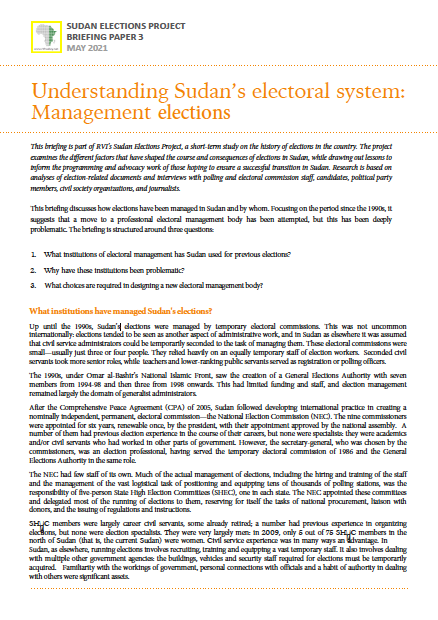
This briefing discusses how elections have been managed in Sudan and by whom. Focusing on the period since the 1990s, it suggests that a move to a professional electoral management body has been attempted, but this has been deeply problematic. The briefing is structured around three questions:
1. What institutions of electoral management has Sudan used for previous elections?
2. Why have these institutions been problematic?
3. What choices are required in designing a new electoral management body?
يناقش هذا الموجز كيفية إدارة الانتخابات في السودان ومن قبل من. بالتركيز على الفترة منذ تسعينيات القرن الماضي، يشير التقرير إلى محاولات الانتقال إلى هيئة إدارة انتخابات مهنية، وسبب فشلها. يتمحور الإيجاز حول ثلاثة أسئلة:
١) ما هي مؤسسات إدارة الانتخابات التي استخدمها السودان في الانتخابات السابقة؟
٢) ما سبب إشكالية هذه المؤسسات ؟
٣) ما هي الخيارات المطلوبة في تصميم هيئة جديدة لإدارة الانتخابات؟
Briefing 4: Understanding Sudan’s Electoral System: Registration and Polling
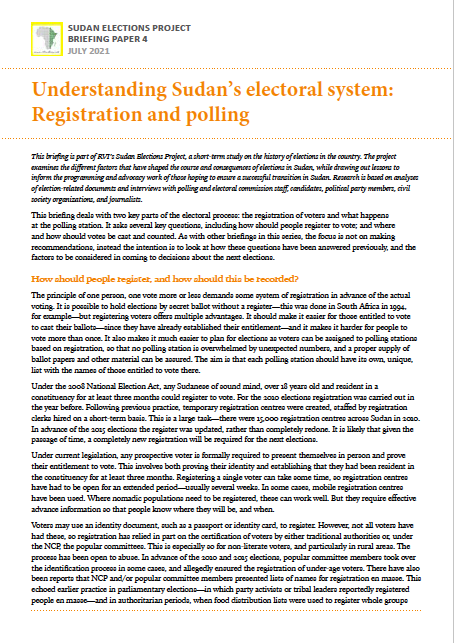
This briefing deals with two key parts of the electoral process: the registration of voters and what happens
at the polling station. It asks several key questions, including how should people register to vote; and where
and how should votes be cast and counted. As with other briefings in this series, the focus is not on making
recommendations, instead the intention is to look at how these questions have been answered previously, and the
factors to be considered in coming to decisions about the next elections.
The registration and polling briefing deals with two key parts of the electoral process: the registration of voters and what happens at the polling station. It asks several key questions, including how should people register to vote; and where and how should votes be cast and counted. As with other briefings in this series, the focus is not on making recommendations, instead the intention is to look at how these questions have been answered previously, and the factors to be considered in coming to decisions about the next elections.
Briefing 5: Understanding Sudan’s Electoral System: Law and Law Enforcement
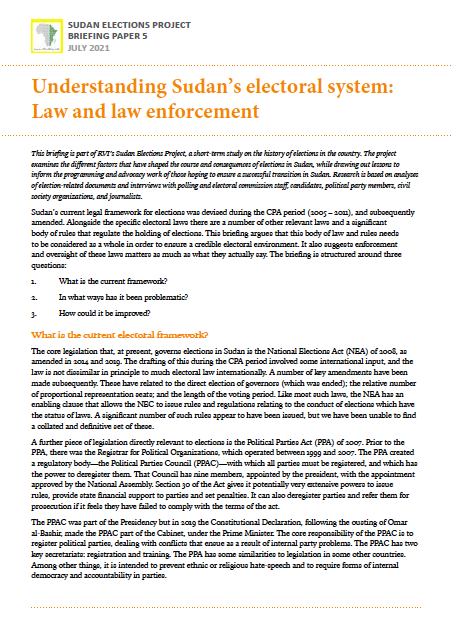
This briefing is part of RVI’s Sudan Elections Project, a short-term study on the history of elections in the country. The project examines the different factors that have shaped the course and consequences of elections in Sudan, while drawing out lessons to inform the programming and advocacy work of those hoping to ensure a successful transition in Sudan. Research is based on analyses of election-related documents and interviews with polling and electoral commission staff, candidates, political party members, civil society organisations, and journalists.
Sudan’s current legal framework for elections was devised during the CPA period (2005 – 2011), and subsequently amended. Alongside the specific electoral laws there are a number of other relevant laws and a significant body of rules that regulate the holding of elections. This briefing argues that this body of law and rules needs to be considered as a whole in order to ensure a credible electoral environment. It also suggests enforcement and oversight of these laws matters as much as what they actually say. The briefing is structured around three questions:
1. What is the current framework?
2. In what ways has it been problematic?
3. How could it be improved?

